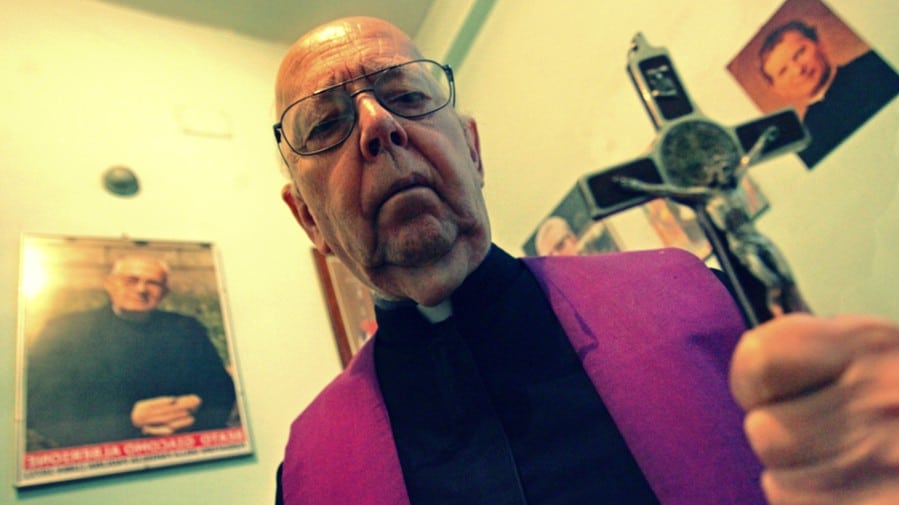Exorcists in the Church: Misunderstood and Marginalized
How are exorcists perceived within the Church?
We are subjected to deplorable treatment. Often, priests entrusted with this delicate mission are regarded as fanatics or even as lunatics. The most disconcerting aspect is that this negative perception often comes from the very bishops who appointed them to this ministry.
What has been the most significant instance of this hostility?
On one occasion, we organized an international meeting of exorcists near Rome and requested to participate in a public audience with the Pope during the traditional Wednesday event in St. Peter’s Square. Our request was submitted following the established protocols, something that Monsignor Paolo De Nicolo of the Prefecture of the Pontifical Household confirmed he had received favorably.
However, a day before the audience, Monsignor Nicolo informed us, visibly embarrassed, that our request had been denied. What an absurd rejection! We were 150 exorcists from around the world, priests appointed according to canon law, with impeccable reputations, and dedicated to an essential ministry. Yet we were treated as if we were intruders.
Monsignor Nicolo promised to send me a letter explaining the situation. Even though five years have passed, that letter never arrived. It is evident that it was not Pope John Paul II who ordered our exclusion. Nevertheless, this episode clearly illustrates the barriers we face within the Church, even from its own authorities.
Satan’s Strategy: Disappearing from the Collective Imagination
You battle the devil daily. What do you consider to be his greatest achievement?
“Convincing people that he does not exist. And he has almost succeeded.”
This denial, unfortunately, has also infiltrated the Church. There are clergy and bishops who no longer believe in the devil, in exorcisms, or in the extraordinary harm he can cause. They have even forgotten the power Jesus gave us to cast out demons.
For the past three centuries, the Latin Church has virtually abandoned the ministry of exorcism, in stark contrast to the Orthodox Church and certain Protestant denominations. As a result, many priests have never witnessed an exorcism or studied it, leading them to dismiss it entirely. This skepticism extends to many episcopates, some of which openly oppose this ministry.
In countries like Germany, Switzerland, Spain, and Portugal, there are no appointed exorcists at all, which is a deeply concerning deficiency.
Is the situation different in France?
In France, the reality is equally troubling. For example, the book by Isidore Froc, titled Exorcists: Who They Are and What They Do, was translated into Italian at the request of the French Episcopal Conference. Yet, nowhere in the book does it mention that exorcists actually perform exorcisms. The author himself has repeatedly stated that he has never conducted one and has no intention of doing so.
Out of nearly 100 French exorcists, only five believe in the devil and perform exorcisms. The rest prefer to refer those seeking their help directly to psychiatrists. This crisis is especially pronounced among bishops, who seem to be the first victims of this erosion of faith in the devil’s existence.
What role do bishops play in appointing exorcists?
According to the Code of Canon Law, bishops have full authority to appoint exorcists. However, many of them have never witnessed an exorcism, despite being responsible for making critical decisions in this area.
When a bishop receives a serious request for an exorcism and fails to act, he commits a mortal sin. This makes him responsible for the suffering of the afflicted person, who may endure torment for years—or even their entire life—when such afflictions could have been alleviated.
Does this mean that most bishops are in a state of mortal sin?
My old parish priest used to say there are eight sacraments, and the eighth is ignorance. While mortal sin requires full knowledge and deliberate consent, the failure of many bishops to provide assistance is a grave shortcoming.
If someone does not believe in Satan, can their faith still be considered Catholic?
No. Let me share an anecdote.
When I met Father Pellegrino Ernetti, an exorcist with over 40 years of experience in Venice, I told him:
—If I could speak to the Pope, I would tell him that too many bishops do not believe in the devil.
The next day, Father Ernetti met with John Paul II and conveyed my concern. The Pope’s response was unequivocal:
“Whoever does not believe in the devil does not believe in the Gospel.”
Does this mean that many bishops and priests are no longer truly Catholic?
Not necessarily, but they are drifting away from an essential truth of the Gospel. Although technically someone can only be accused of heresy if they persist in an error after being admonished, in practice, no one accuses bishops of not believing in the devil.
However, there are bishops and cardinals who, upon assuming leadership of their dioceses, strip all exorcists of their faculties or declare that these practices are obsolete. This phenomenon reflects a trend influenced by certain biblical scholars who have distorted traditional teachings.
The Impact of Liturgical Reforms
The Second Vatican Council only requested a review of certain liturgical texts, but this was distorted into a complete rewriting of some rites, often worsening them. For example, the new Ritual of Exorcisms removed prayers that had been effective for more than 12 centuries.
The rite of baptism was also altered, weakening the minor exorcism that always played a fundamental role in this sacrament. Even the book of blessings underwent drastic changes: all references to divine protection against Satan and the intercession of angels were removed.
Even the Our Father prayer was mistranslated. Instead of saying, “deliver us from the Evil One,” we now say, “deliver us from evil,” diluting its original meaning.
The damage is clear: the spiritual defense against the devil has been weakened, undermining the rituals that for centuries protected the faithful […]





